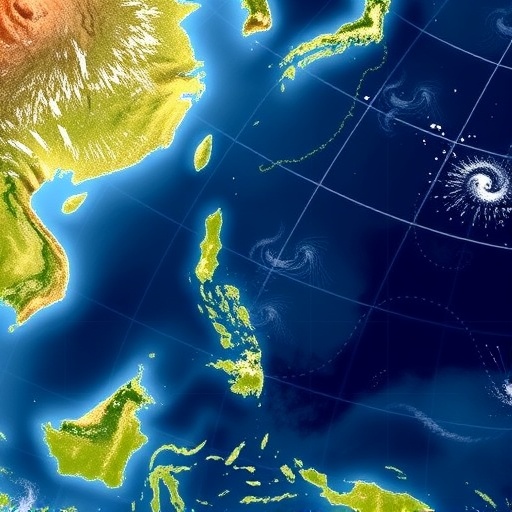In a compelling study published in Communications Earth & Environment, researchers present evidence suggesting that the prolonged warming of the South China Sea is leading to significant changes in ocean circulation patterns. This research, spearheaded by Li, Ge, and Teng, focuses on how rising temperatures are not only affecting marine ecosystems but also impacting regional weather patterns and climate dynamics. The authors argue that these changes could have far-reaching implications for both local fisheries and broader climatic processes.
The South China Sea, a pivotal marine region, is seeing accelerated warming due to global climate change. This study indicates a concerning trend: the deep circulation in the sea is weakened, which could hinder the transport of essential nutrients and affect the biodiversity that depends on these nutrient flows. Traditionally, this area has been known for its rich marine life; however, the onset of climate-induced alterations could spell trouble for various species that are sensitive to temperature changes.
In detailing the methodologies employed, the researchers utilized data from extensive oceanographic surveys alongside advanced modeling techniques to assess the implications of warming on circulation. The study meticulously charts the variations in temperature and salinity across different depths and areas of the South China Sea. By mapping these changes, the researchers were able to highlight how the deep-water currents, crucial for nutrient distribution, are being disrupted.
One of the critical findings of the research indicates that as surface temperatures rise, there is a stratification effect occurring. This stratification prevents the mixing of warmer surface waters with the cooler, nutrient-rich waters below. Consequently, the diminished deep circulation leads to reduced nutrient availability, which adversely affects phytoplankton growth. Given that phytoplankton forms the base of the marine food web, this poses significant risks not only for fish populations but also for the entire marine ecosystem.
The implications of this weakened circulation are particularly alarming for local fishing communities that rely on healthy fish stocks for their livelihoods. As nutrient levels plummet, fish populations are likely to decline, leading to economic strain for those who depend on fishing as their primary source of income. Already, fishermen in the region are reporting decreases in catches, a trend that may be tied to the altered ocean conditions outlined in this study.
Moreover, the study highlights that the ramifications are not isolated to marine life alone. The alteration in oceanic circulation could influence atmospheric patterns, particularly monsoon systems that are critical for weather in many Southeast Asian countries. This raises concerns about food security as agricultural conditions may start to fluctuate based on changing rainfall patterns, caused by the disruptions in marine currents.
In terms of broad-scale climate impact, the researchers suggest that the weakened circulation could contribute to more extreme weather events. With warmer waters contributing to more potent tropical storms, regions surrounding the South China Sea might face heightened risks of flooding and destruction during storm seasons. This potential for increased natural disasters adds another layer of urgency to the findings of the study.
The authors also emphasize the importance of immediate action in terms of climate policy and marine conservation initiatives. They advocate for sustainable fishing practices and the protection of vital marine habitats to mitigate some of the worst effects of warming waters. Such proactive measures could help ensure both the resilience of marine biodiversity and the survival of fishing communities that are currently facing challenges.
Despite the grim outlook presented in this study, the researchers remain hopeful that increased awareness and concerted efforts can lead to positive change. They call for further interdisciplinary research that will encompass not just oceanography but also socio-economic studies to better understand and address the issues at hand. This holistic approach could yield not only scientific insights but also actionable strategies to promote sustainable development in the region.
In conclusion, the findings of Li, Ge, and Teng represent a crucial addition to the growing body of literature on climate change and its impacts on marine environments. As the world grapples with the realities of a warming planet, understanding the localized consequences of these changes becomes increasingly important. The South China Sea serves as a microcosm of the broader challenges posed by climate change, underscoring the interconnectedness of ocean health, regional economies, and global weather systems.
As we look forward to further research in this critical area, the ongoing dialogue among scientists, policymakers, and communities will be essential in devising strategies that not only protect marine ecosystems but also secure the livelihoods of those who depend on them. Every step taken towards understanding and mitigating these changes can contribute to a more sustainable future for the South China Sea, its inhabitants, and the countless lives that extend beyond its shores.
Subject of Research: Impact of prolonged warming on ocean circulation in the South China Sea.
Article Title: Weakened circulation in the deep South China Sea triggered by prolonged warming.
Article References:
Li, B., Ge, Y., Teng, F. et al. Weakened circulation in the deep South China Sea triggered by prolonged warming.
Commun Earth Environ 6, 672 (2025). https://doi.org/10.1038/s43247-025-02582-w
Image Credits: AI Generated
DOI: 10.1038/s43247-025-02582-w
Keywords: South China Sea, ocean circulation, climate change, warming, marine ecosystems, nutrient availability, fishing communities, atmospheric patterns.




